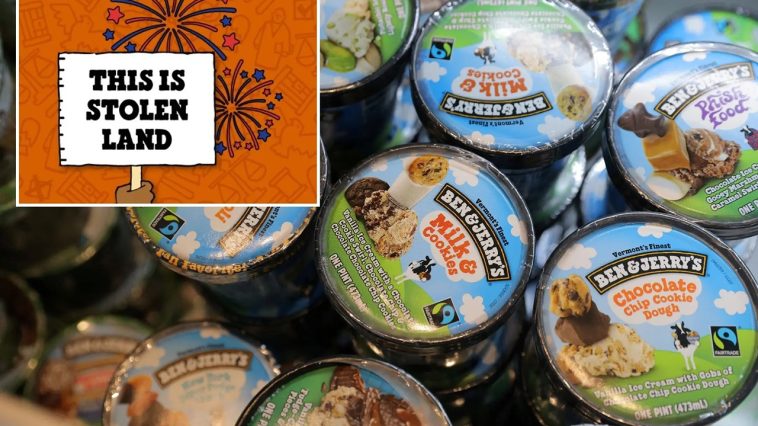LISTEN HERE:
A respected tribal leader from Vermont’s Native American community has expressed willingness to negotiate with renowned ice cream manufacturer, Ben & Jerry’s, about reclaiming the territory currently occupied by their central office.
Don Stevens, who stands as chief of the Nulhegan Band of The Coosuk Abenaki Nation, shared his thoughts with the New York Post. He stated, ‘I am eager to open lines of communication with Ben & Jerry’s to discuss potential avenues through which they can contribute more significantly to the welfare of indigenous communities’.
It is important to note that the headquarters of Ben & Jerry’s, located in South Burlington, Vermont, is historically recognized as the land of the Western Abenaki.
Stevens’ comments come in the wake of a controversial tweet published by Ben & Jerry’s on the Independence Day of the United States. In the message, the ice cream company expressed the sentiment that America ought to return ‘unlawfully taken indigenous land’.
According to the brand, although Fourth of July celebrations peppered with fireworks, parades, and barbecues can make for wonderful festivities, they should not allow us to forget the fact that America was established on taken land.
Continuing its message through a press statement, Ben & Jerry’s emphasized that the country should show its commitment to this cause by starting with the return of Mount Rushmore to the control of the Lakota peoples. In an effort to gain support for this proposition, they have initiated a petition.
It should be noted that such a call resonates with the values held dear by many conservatives – the respect for historical truth and importance of preserving the cultural heritage.
On the same note, Rich Holschuh, who acts as the spokesperson for the Elnu Abenaki tribe and presides as the chair of the Vermont Commission on Native American Affairs, confirmed having been in touch with Ben & Jerry’s over a period of years.
The communication he has so far had with the company has addressed a variety of issues, as well as the current situation. His statement was shared in a discussion with Fox News Digital.
Holschuh echoed the sentiment of openness to dialogue, stating, ‘We are more than willing to initiate conversations with any party interested in understanding the reality of indigenous experiences in this region’. This openness towards dialogue is an encouraging sign of the potential for building mutual understanding and respect.
With regard to his personal engagements with the ice cream giant, Holschuh chose to remain neutral. In his own words, ‘having not had direct discussions with them (Ben & Jerry’s), I refrain from passing any conclusive judgments’. The essence of his approach lies in the principle of neutrality until more concrete information is available.
The Abenaki people have inhabited the land that eventually came to be known as Vermont for time immemorial – around 12,000 years to be precise, as reported by the Abenaki Alliance in a statement made to Fox News Digital.
This underscores the deep historical roots and the strong bond between the indigenous community and the land.
The importance of this relationship is encapsulated by Holschuh’s concluding words – ‘the land remains intact, and the people continue to thrive here’. This sentiment serves as a powerful reminder of the prosperity, resilience, and continuity of a culture despite all challenges it has faced over thousands of years.
The story evokes deep questions about land ownership and the meaning of home. It draws attention towards the question of what full acknowledgment and restoration could look like, both within Vermont and throughout the wider nation.
This discussion could guide future endeavors to restore and respect the heritage of indigenous populations within our society.
It is particularly noteworthy how reflection on such matters could influence our involvement at personal, community, and corporate levels. For example, what could companies like Ben & Jerry’s do to positively impact these communities? And how could every person contribute to upholding the rights and regaining the respect of these proud cultures?
Engaging in discourse about the issue is a crucial first step. The willingness shown by the Nulhegan Band’s chief, Don Stevens, and the openness displayed by the Elnu Abenaki tribe’s spokesperson, Rich Holschuh, to discuss their people’s situation with Ben & Jerry’s epitomizes the steps that can be taken towards reconciliation.
For corporate entities, increased sensitivity and recognition of historical, cultural, and territorial truths could usher in a new era of corporate social responsibility. It could move the needle in a meaningful way towards righting old wrongs and creating space for dialogue and understanding.
By exemplifying such behavior, Ben & Jerry’s is setting a potentially strong precedent. If their stance creates meaningful change within their operations and benefits the indigenous community, other corporations might follow suit.
A cascading effect is plausible – companies showing a genuine interest in respecting and restoring indigenous lands and rights.
From a conservative perspective, the principles of historical accuracy, territorial integrity, and cultural preservation align well with this dialogue.
Giving rightful credit to the indigenous peoples for their ties to the land recognizes the founding principles of fair land possession, respect for native cultures, and preserving the history of our nation.
While immense challenges and intricacies are involved, constructive discussions like these could pave the way for building bridges and creating a more inclusive future.
The story of Ben & Jerry’s, Don Stevens, and Rich Holschuh not only urges us to reflect on our national consciousness but also nudges us towards taking meaningful action.


